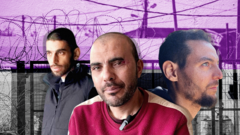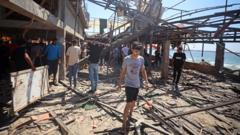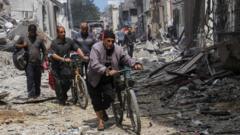Five released detainees from Gaza have shared harrowing accounts of torture and mistreatment during their time in Israeli custody. Their experiences, detailed in interviews, include allegations of severe physical abuse, chemical burns, and psychological trauma. The Israeli military and prison authorities have denied systematic abuse, yet echoes of previous similar accusations raise questions regarding human rights practices.
Testimonies of Torture: Gazan Detainees Share Disturbing Experiences from Israeli Custody

Testimonies of Torture: Gazan Detainees Share Disturbing Experiences from Israeli Custody
Released Palestinian detainees recount accounts of severe mistreatment and torture faced while in Israeli detention, sparking debates over human rights and treatment of prisoners.
Released Palestinian detainees have provided heartbreaking accounts of their experiences while in Israeli custody, highlighting allegations of torture and severe mistreatment that have ignited concerns over human rights violations. The testimonies, shared in interviews with the BBC, detail incidents of physical and psychological abuse, with five men describing their ordeals after being arrested under Israel's Unlawful Combatants Law.
Mohammad Abu Tawileh, one of the detainees, recounted being subjected to chemical burns and set on fire by Israeli soldiers. His story reflects the claims of other detainees who reported similar experiences of abuse – being stripped, blindfolded, and beaten, as well as suffering from electric shocks and witnessing the deaths of others among them. These testimonies were collected in the context of ongoing reports about misconduct in Israeli military barracks and prisons, particularly following the escalated violence in the region subsequent to the attacks by Hamas on October 7, 2023.
The detainees, who were released as part of a ceasefire deal, professed that their detentions were tied to accusations of links to Hamas – accusations they denied. In response to the allegations, the Israeli Defense Forces (IDF) stated a rejection of any systematic maltreatment of prisoners, emphasizing that specific cases would be examined. Meanwhile, the Israeli Prison Service (IPS) claimed it had no record of the described abuses.
The accounts given by the detainees are aligned with previous investigations by human rights organizations, illustrating a persistent pattern of mistreatment. Experts, including Dr. Lawrence Hill-Cawthorne from the University of Bristol, noted that the behavior described by the detainees contradicts both international and Israeli law regarding humane treatment of prisoners.
The testimonies also underline a broader context of hostility and fear surrounding the ongoing conflict in the region. Concurrently, evidence was presented of similar incurrences of violence and degradation against hostages seized by Hamas, displaying the grim realities faced by many in this conflict-ridden area.
As the international community watches closely, calls for independent investigations into the treatment of detainees continue. The released individuals not only returned home burdened by the physical scars of their experiences but also by the harrowing memories that will linger long after their ordeal. Their appeals, underscoring a need for acknowledgment and reform in treatment practices, echo the larger struggle for human rights amid the turmoil that defines the Israeli-Palestinian conflict.





















